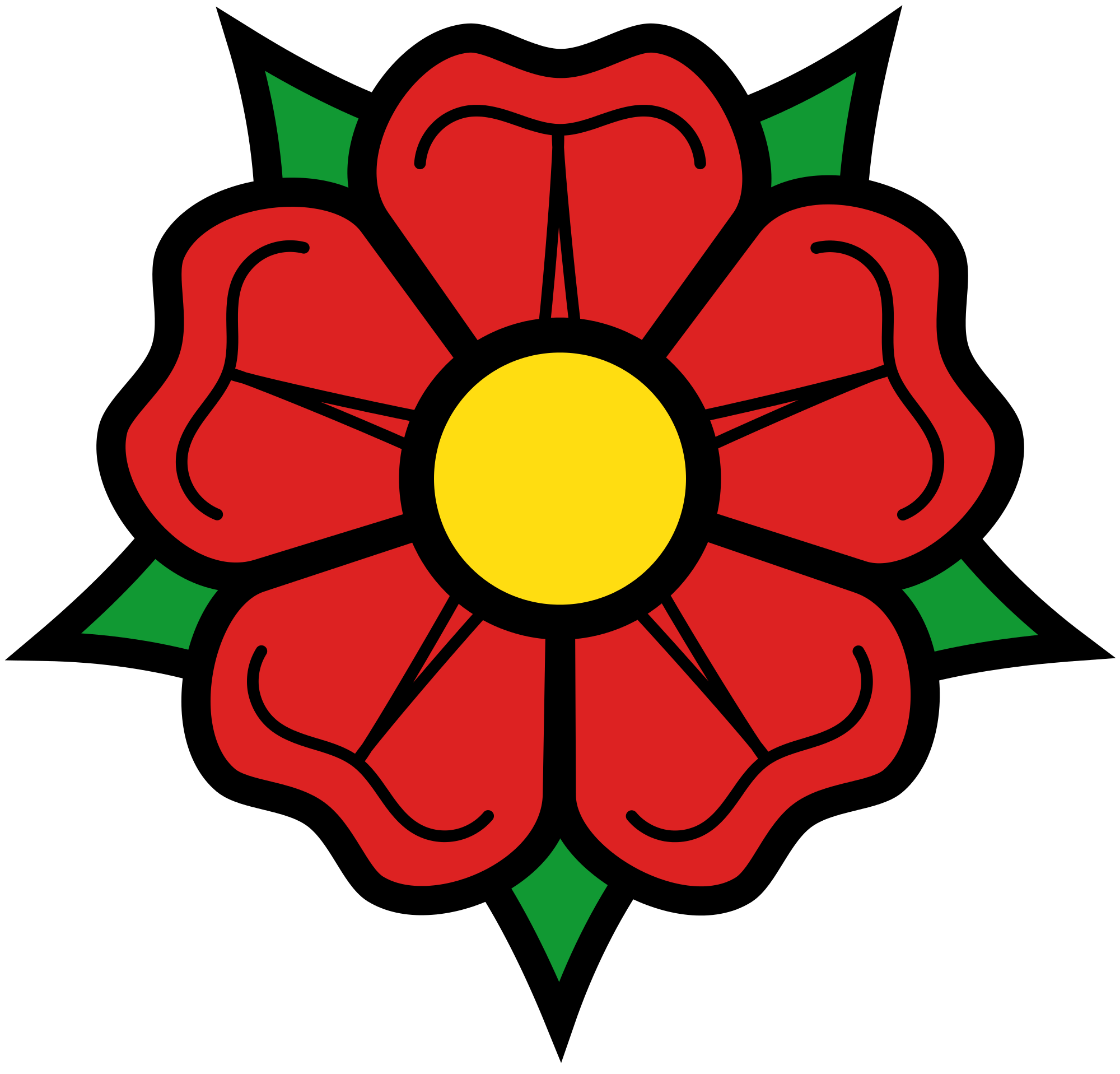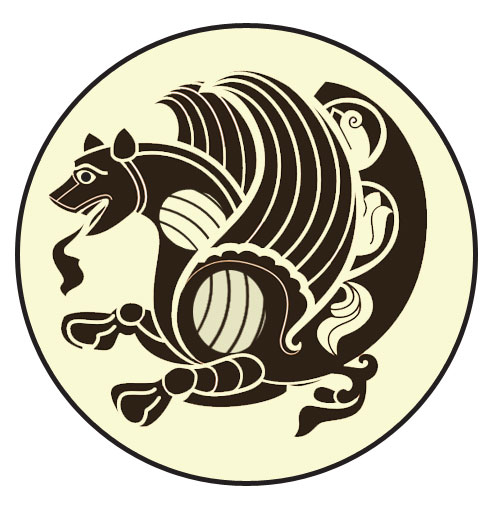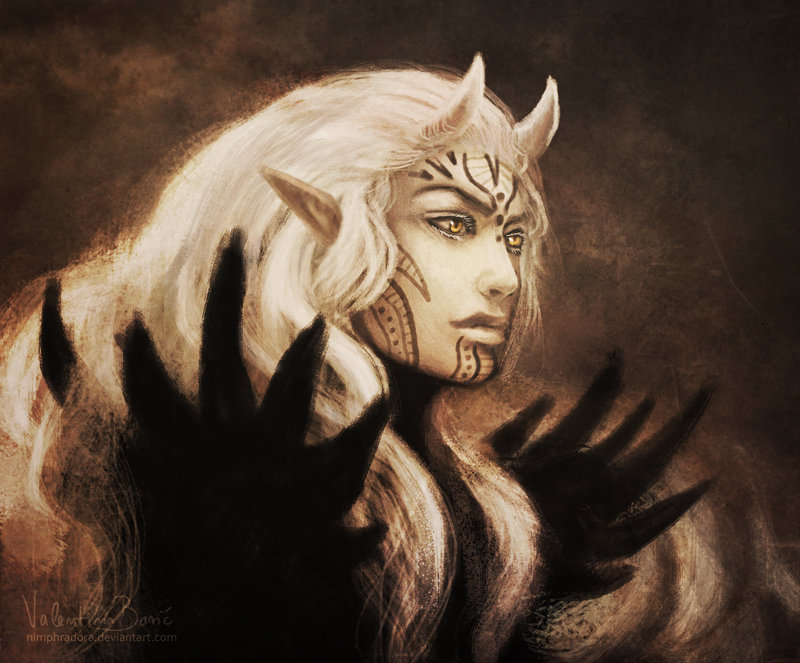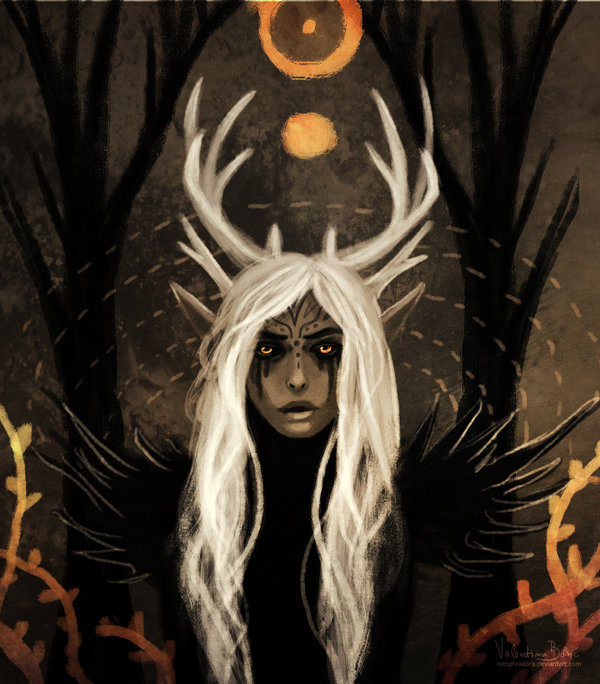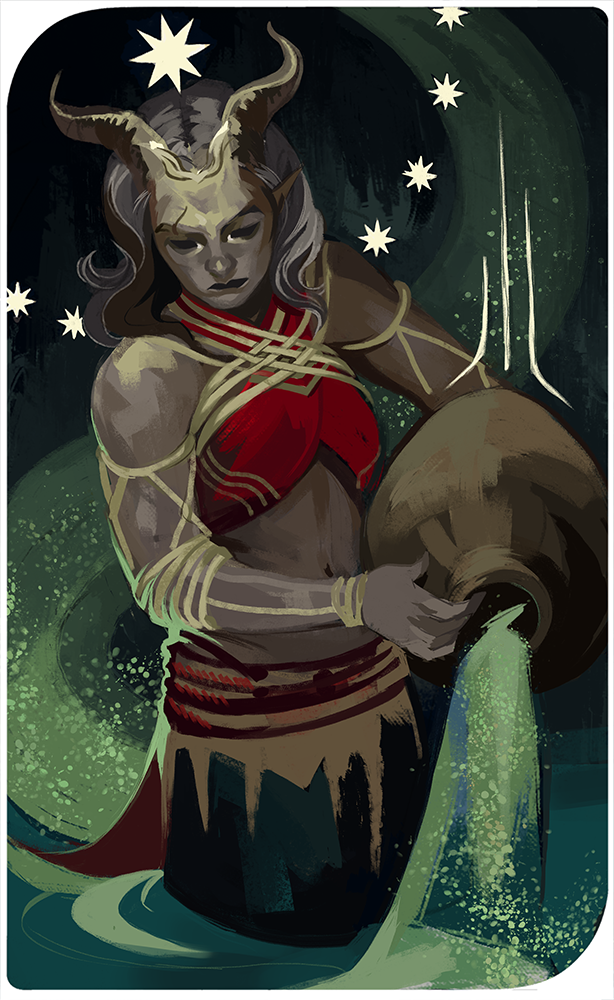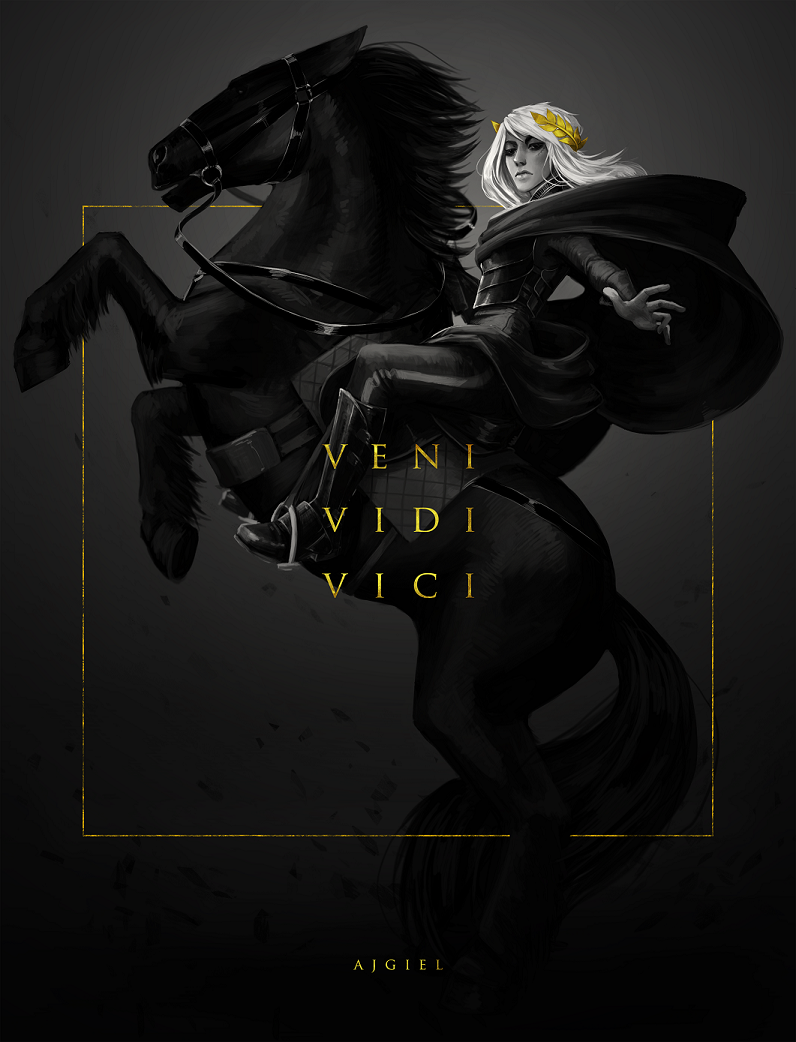Religion (Sfartalheim Supplement)
There are all sorts of religions, spirits, and gods that transcend borders hold sway over the different peoples all over the lands.
Worship[edit]
Praying, worshipping, and praising deities within this world is considered normal or routine daily activity causing very real physical changes in the realms. The act of believing in either the actions of the divine or the beings themselves can cause it to become a reality. The chances of said belief becoming real increases the more fervent and numerous the believers are. Although the Humans didn't know it, their pre-historic pantheon in this world consists of both Celtic and Norse gods. Other races simply refer to them as the Human Pantheon. The Skanii have a still practicing religion of nature spirit or ancestral worship, unlike their other Skanzen neighbors who adopted the Pentarchy. Most Elves either converted to the Pentarchy or retain worshipping their old Alf Gods from the times of the ancient Elven Empire. The Pentarchy was a religion birthed from the struggles of what many believed to be a demigod Human who kicked out the Elven Empire from Inteoch. It is a monolatristic belief system where a righteous and evil god both exist but worshipping either one will tip the balance of the cosmic war. The Elash (meaning "Holy Will") was first thought to be a sect of the Pentarchy until the Elashii rejected the idea of the evil god being a divine being but see it as a supreme demon, calling it Divandan Divae (meaning "Demon of Demons"). There is also the sect of the Pentarchy known as Belogradie Pentarchisum which is mostly followed in Osterland with the religious authority driving from Kiev instead of the Pentarch himself. Last to form but not the least is another sect of the Pentarchy known as Zekisum. These followers reject the authority and influence of the Temple over the daily lives of most people and the governments they live under. Although, the Zekumites mostly follow the same religious interpretation as the Pentarchy.
Pentarchy[edit]
The origins of the Pentarchist cult derives from a single Human living in Inteoch, Kornos. Although there is little historical information about his early life out of the Vadas (the religious text in which his followers wrote down into a grand collection), we do know he wasn't born inside the Elven Empire. In fact, he recounts growing up amongst the nomadic tribes beyond the Oster frontiers just shy of the Elven border. Coming to adulthood as a mercenary, most of his work revolved around being contracted to the Imperial Elven government. Around the age of 35 (in 160BT), he sheathed his sword and carried his shield to settle down to live a life of a potter in Inteoch. Yet only a year or so within the city, he began to receive visions of a great slaughter in this new city and Kornos developed a disillusion for the Elven Empire. For he was a freeone but like a slave, he was restricted from certain services due to his race. He had money but paid extra taxes for being a foreigner. He lived in the city but the governor could kick out all Human on their whim. There was public sadism even within poorer Elven families who could only afford one slave. Degeneracy with the city's military nobility was rampant leading to coffers being emptied to fund extravagant blood-orgies, and the so-called rulers neglecting the daily affairs of the city.
Thus, a being called Druge came forth in his dreams to offer unlimited power to raze the city and form a roving band of adventurers to seek glory destroying the decedent Elven Empire. While contemplating this offer, Kornos fell on the floor of his apartment to violently shake. The world around him couldn't be sensed but a being named Asurhai approached him. This being offered him the power to prevent the great slaughter in his nightmare but at the expense of his life. He accepted Asurhai's hand to grant him this fate then he was told to urge the city's population to evacuate by the day after tomorrow.
The day after, Kornos stood on boxes high above in the marketplace to tell the people to stay outside of the walls for but a day. He was quickly arrested for inciting panic and was brought before Governor Tyrana for judgment. Unwilling to hear the case before her, she ordered Kornos executed as a sacrifice for whatever god the captain of the guards wanted. With incredible luck, speed, and strength, he was able to break free of his chains. First killing the guards around him then winning a duel with the battle-magi Tyrana. Slipping away from the palace after the fight, Kornos came back to essentially pull off a coup with former and active mercenaries, freed slaves, disgruntled soldiers, and others who received similar visions as his. Once taking over the palace, the Elven followers sent out false orders to the city garrison to evacuate both military and civilian populations before sunset. Mirecouisly, the followers of Kornos managed to pull off the stunt before a falling star crashed into the residential district. In the panic and celebration of adverting disaster, Eirden (he was effectively the leader of Kornos' Elven followers) sneaked up to stab Kornos in the back while he looked over at a cheering crowd. With his dying breath, he named Eirden traitor to his closest followers. Those that happened to be near were Human mercenaries that quickly slew the Elf rogue, which caused the Elven followers to kill said mercenaries. It eventually ended with the Elven population fleeing from the city thinking it was another slave uprising while killing any non-Elf along the way. The remaining Elves who chose to stay was slaughtered in the race riot immediately after most of the Elves fled.
Other such heroes, visions, sayings, and stories about the beings known as or related to Asurhai and Durge began to spread from Inteoch. They all had five tenets in common from the original beliefs of Kornos. First, there are only two real gods and they are Durge and Asurhai. Second, Durge is the god of darkness, chaos, lies and all things evil in the world. While Asurhai is the god of light, order, truth and all things righteous in the world. Third, such things as arrogance or decadence must be avoided at all cost. Forth, degeneration of the mind, body, and soul will lead to an unhealthy life for oneself and those around them. Fifth, through actions following the will of the gods can one decide the fate of the cosmic war.
The Inteoch Priestship was established in 147 AT to codify then spread the Vadas using warrior monks. The Palmaro Priestship was established in 206 AT and founded the monastic schools to debate and disprove heresies and infidel religions. The Belograd Priestship was created in 261 AT and it standardized the concept of the Temple tax, to keep funding Temple institutions and prevent nobles from becoming too rich. The Marsail Priestship was made in 295 AT where the organization of the Ordo Hospitalis was first recognized then funded by the Temple. The Barcerlon Priestship was formed in 313 AT fund the creation of Ordo Belis to help assist King Franken in his holy wars. With the five Arch-Priest, the Temple of Kornites was then later commonly referred to as "The Temple" or "Pentarchy". Although the decisions made by the Arch-Priest voting on religious or political matters are often ignored by the Belogradie Pentarch who's power is tightly controlled by the government under Kiev. This sect of the Pentarchy is known as the "Belogradie Pentarchisum" and they follow a slightly different version of traditional Pentarchisum.
Zekisum[edit]
Johannes Zekum was a wander cleric Dwarf from Rheenland who used to live amongst monks for a good 30 years of his life. By the time he was 50, he had lived in Franken-onder-Rheen, Nurrenborg, Kollstein, and Magenborg helping folk along his journey. He finally settled down to live a quiet life for the next 3 years in Kranzborg. The years had taught him the corruption within The Temple with the wealth and power of high-ranking priests. How this very same clergy acted like nobles with lands while disregarding the plight of the peasants. Their behavior with arrogance going so far as to not help nobles deal with daemons or warlocks unless there is a hefty temple donation involved. This idea to strip the Pentarchy of all wealth, power, and influence inside the state came from the premise that the clergy would act more holy without luxuries. Another major idea was that Durge was not a god but was similar to an arch-daemon, thus the end of the cosmic war is already determined with Asurhai's victory to usher in a world of harmony. Indeed, once he started distributing copies of his essay (in 1400 AT) Zekisum quickly gained traction among Tallian and Kranzlik nobles. From there on the sect radiated from Kranzborg like wildfire. From the Oster frontier to Magenborg and everything in between, it was the concept of not relying on the Pentarchy from everything as simple as book copying to daemon slaying. Even those of low ranking priests and monks sought major corruption culling and saw Zekisum as a great instrument. Others believed that Pentarchisum was too close to Alfen worship with the acknowledged existence of two gods. Thinking that ridding the thought of Durge as a god would eliminate people from worshipping him. There were some who totally bought into the predetermined outcome of the cosmic war as a great conclusive hopeful ending to the vague answer the Pentarchisum gave.
For as quick as the sect was spreading, the Temple was already formulating a plan to counteract this dissent. The Pentarchs voted to declare Zekisum a heresy then called a council of the Arch-Preist to discuss a way to stamp out the idea. They passed several new laws Pentarchist states must follow including increasing the Temple tax, outlawing donations to the Temple, establishing Ordo Inquisatoris to hunt heretics, convert Zekumites, censor works, and advise nobles. This would come into conflict between the more militant branches of Zekumites but the sect was initially a peaceful movement to change the religion over the course of centuries. Then came the states who surprised the Pentarchy by not only tolerating but accept Zekisum as the state religion. This would cause many wars between the major powers and within states like the Ontisch War, Lyonese Inquisatoris Wars, Occiton Civil War, Imperial Wars of Religion, Tsuon Revolts, and the Eiersh-Lyonese War. In the end, the well-intentioned ideas of Johannes Zekum would destroy Sentra and Vesterland in bloody conflicts leaving millions dead.
Elash[edit]
Much in the same fashion as Pentarchisum, there is another religion founded by an exteriority individual, Elash. The difference being that this time the belief was monotheistic. There was once a person who also received revelations from the same being known as Asurhai, yet he claimed that this was an old name and wished to be called "Wahy" instead. Neither the gender, race, or name of the person could be discerned but is simply called "The Prophet" by followers. This was due to the fact this prophet inherited a curse that petrified anybody who saw their body and wished for their message to be heard but never who said it. The idea is that a message has to stand on its merits rather than by who espouses it. Due to the anonymity of this person, they are also given the nickname of "1000-Name Prophet" and "Faceless Messenger".
At first, The Prophet preached about charity, equality, rejecting all other gods but Wahy, and bring about a holy kingdom on Arda. At first, the Sha ruling over the Tukchan thought the complaints from the local nobles hearing of Elash was overexaggerated about a Pentarchist heresy. That was until The Prophet moved to Tisifon then tried to overthrow the government and proclaim Wahy was the only true God. This would fail with many of the leaders amongst the followers being publically executed then banishing The Prophet from the Sultanate. After convincing the Abbynid tribe to convert to Elash then again convince them to back his attempt to establish a theocracy from Tisifon. Returning to the Tukchan Sultanate with an army in 710 AT, this time it ended with the Elashii army being soundly defeated and The Prophet imprisoned in the Fortress of Oblivion. Supposedly with a divine intervention, The Prophet escaped the prison by jumping out of an opening in the wall from 10 meters above the ground. 12 years later, The Prophet would die in their sleep at their house just outside the walls of Medis.
Writing down many things over the course of 21 years, the most sacred of the text in the Kurer (the Elashii religious text) is The Revelations. These writings were made personally by The Prophet describing the conversations between them and Wahy or the visions shown. The second series of writing are religious laws made to be implemented by any government written either by The Prophet or one of the original followers. The third writings are secondhand accounts and witness testimonies written by followers during or after the life of The Prophet. Elash emphasizes ideas which can be categorized into three groups. The first is the duty of the population to donate to charities instead of the governments forming welfare programs. This is to measure the kindness of the people rather the hearts of their rulers. The second group is the establishment of a holy government, a ruling governing body who's leaders derives from the clergy than the materialistic or morally questionable landed nobility. The third category is equality, from the highest priest to the lowest merchant, all are to be judged based on their merits and their belief in Wahy rather than the class they are born into.
Alf Gods[edit]
The origins of the Alfen Gods stretch back to before the time of history itself. In the murky annals of ages unmemorable, from the pits of Chaos came the beings who supposedly created the entire world. The first and greatest of these gods was Hora who grew bored with the static nature of the universe then created time to allow the worlds to morphe. From the evolving worlds came Venaros, god of the hunt who grew bored until creating all the creatures of the realm to hunt. After the first Elves where filled with javelins or arrows by Venaros, Kruor sprang forth from the ground to collect the dead then drag the souls down to the depths of the sea. Then when the first Elven tribes settled a dispute by throwing spears at each other and there was bloodshed, the pool of blood served as a cradle for Belasaria, the god of war.
Although there are little more than 100 gods within the Alfen pantheon, these main four gods receive the most attention from cults and record keepers. We know little to nothing about the other gods but they range from every little aspect of life from farming, traveling, and debauchery to painting. What we do know is that the gods fall into the category of indifference, sadistic, or simply being evil, although this is based on a modern viewpoint which the Elven Empire didn't have. Even these gods had multiple aspects woven into one being like Hora, she happened to rule over time and all inanimate material things. Hora is attributed with decadence, wealth, and arrogance based on other stories she is mentioned in.
Described to have white horns protruding out from just above her forehead, face marked with ritualistic paint, and piercing yellow iris. When not shapeshifting, she is normally dressed in a fine raven feather garb. Interactions between both gods and mortals with Hora seem to indicate that she approaches everybody with an indifference or aloofness which tends to annoy them. Not easily roused anger (or any emotion in fact) as a common theme amongst tales involving her. Another is that she is tirelessly working to achieve some sort of plan and that she has little if any reaction when one of her plans failed. Tales of Hora have existed from before the first Islander Elf understood what writing was. There are three main cults which were founded when the Elven Isles were developing into urban centers. The cult of creation as Hora is seen as the mother goddess who gave birth to time, change, and action itself. There is the cult of wealth for she technically owns the entirety of the universe and all those inhabit it. Then by the fall of the league, the cult of excitement was created by eccentric nobles who wanted an excuse to stave off boredom. These cults practiced such strange rituals like participating in orgies, creating great artworks, and tax evasion.
Venaros continues the tradition of appearing with horns on her head like her mother, Hora. Most of the tales of the smiling god say that when she climbed out of the Chaos of existence, she had black hair, yellow eyes, and was naked. After willing all the creatures of the realm into existence, the first thing she did was conjure a javelin, the second thing she did was find a great black eagle then killed it. Using the feathers, she fashioned herself a vest and short skirt to warm herself. While making the clothing, Hora appeared before her to ask that if there was any creature which Venaros would spare. "None!" She answered before throwing another spear to kill an Elf a mile away, "Not even my favorite ones". Hora folded her arms before asking, "Not even the majestic winter stag?" Venaros replied by marching off to the far north after adjusting the clothing on her to fit snuggly. Once she arrived in the frozen north in the land of ice, fire, and snow, she lowered her spear when approaching the winter stag. The animal was curious and stood his ground while the god came closer. Once 15 steps from the stag, Venaros immediately threw her weapon to catch the snow white creature in the neck. As he was bleeding out, the god ripped the antlers from his head to crown herself as queen of the hunt. In this process, she gained face markings like a wildcat.
Krour is the last of the pre-historic gods to be mentioned amongst the first gods. For when Venaros slew the first Elf did the first intelligent being die in the world. The god of death clewed out of the earth as she was born from the dirt, rocks, mud, and minerals of the world. Skin gray, hair brown and dragon horns sitting on her head, she was bearly recognizable to be based on Elven anatomy except for the pointed ears. When the first peoples died for Venaros' amusement, Krour would frown at the tragic loss of life before beckoning the stars to fill her clay jug with celestial water. She uses this celestial water to wash away the soul from the body to send the spirits to the depths of the sea. If the proper burial or cremation rites are not performed than Krour will do them for the dead but at the cost of those that were supposed to perform them. The cost can be anything from a bruise to being killed themselves or others close to them. Those that are supposed to be doing the rites can be co-workers, friends, family, comrades, enemies, or neighbors who can bury or burn the body. Nicer compared to the two older gods, Krour cares to ease suffering in the world and provide the service of bringing peace to the dead while sending their souls to the eternal darkness. She is usually upset with the other three main gods who holds no value in morals and often outright battles them to prevent a greater loss of life. Many of the cults for the other three gods paint Krour in a negative light calling her the "useless god", "the troublemaker", and "cowardly one".
Belasaria was the first of the gods to appear in history as she was mentioned in tales just prior to when the Islander Elves learned writing. Quickly transcribing the oral stories to clay tablets, the Elves managed to leave behind rather accurate chronical with little variation from the original. Said to be born from the blood pool of Elves who slain each other in the first battles. She came out of the red liquid with blond hair, pale skin, and covered in scale armor. The first thing she did was fashion a sword by beating a mountain into submission with her bare hands, naming the weapon "Gleadis". The second thing she did is wrestle a titanic shadow horse to become her mount. The third thing she did was to loot a golden laurel wreath from the Dwarves who forged it using the submerged Rheengald, after a series of wars where Belasaria punished them for cheating in a tournament. She is often depicted in whatever armor is considered the best at the time and is accompanied by a hawk. The bird is called "Stratagai" and serves as the scout and brings news of all the conflicts in the world. Although she acts stoic more often than not, the sight of blood or gore excites her on the battlefield. Rather a disciplinarian, she will go out of her way to enforce rules within sports as well. Where Hora sees Kruor as unnecessary for mortals, Venaros hates how she interferes in her affairs, Belasaria thinks the death god is cowardly. For the gray god is willing to fight others gods but not willing to slay them. Being the weak-willed character the war god believes her to be. She is said to have killed another unknown god but records to find out this being is almost non-existent.
For almost 2000 years have the Alfen Pantheon lasted as an organized religion. It wasn't until the Elven Empire which sponsored the worship of these gods collapsed, and was the only state to officially establish it as the state religion, did the Alfen Pantheon become a squabbling mess. The first cults for the gods are believed to have sprung up 200 years prior to Ilydrium's foundation. This pantheon would go on to grow and incorporate the many different gods from the Elven tribes on the mainland. Another feature is that most of the gods being female indicate the clear shift from the pre-historic egalitarian society to a more matriarchal one. Indeed, one of the older text amongst the Belasarian cults said, "Hither forth my sons and march to war with the sounds of my drums and hark my daughters! For thou must hasten to be ready when called upon to lead them on the bloody battlefield". Meaning in most aspects of the military, the males are expected to follow, serve, and die by the females' orders or leadership. What is more is that this was a trend becoming popularized in other segments of society as the empire was expanding. By the time near the fall of Ilydrium, the Alfen cults were falling out of favor amongst the citizens as they would experiment by joining foreign cults like Pentarchisum, Tuken hero cults, and Skanii spirit worship. It was the seemingly indifferent or malevolent behavior of the gods which caused Imperial Elves to flock out of normalcy during times of great turmoil. Examples of these times include the "Age of the Empire at War", the failed Skanzen campaign, or the Barbarian Coalition War. Although a shadow of its former self, Alfen worship is stubbornly held out amongst the Vesterling communities in ghettos, groves, and in Osterling estates.
Back to Main Page → 5e Homebrew → Campaign Settings → Sfartalheim


